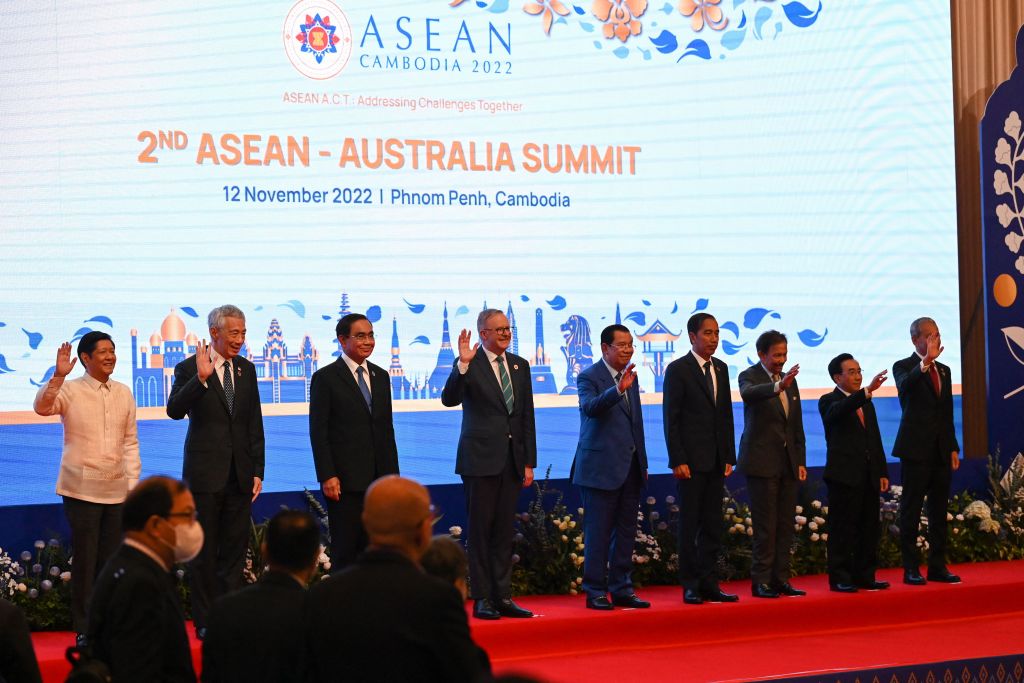
The headline news for Australia out of last week’s G20 summit in Bali was the meeting between Prime Minister Anthony Albanese and Chinese leader Xi Jinping. The prospect of repairing relations between Australia and China is an overdue development and in the interests of both countries.
But while China tends to dominate the foreign policy debate in Australia and elsewhere, there’s more to our engagement with Asia than getting on with Beijing. The Albanese–Xi meeting appropriately took place in the midst of three of the biggest leaders’ summits on the international calendar—which, as it happens, were all held in Southeast Asia.
If Australia’s relationship with China is to have a sustainable recovery, it will be built in large part on demonstrating a strong diplomatic presence in ASEAN, which straddles the region of greatest strategic importance to us. ASEAN also has a record of convening ‘inclusive’ meetings that bring all sides, not just the like-minded, into one room.
Sure, the Albanese government has promised a continued commitment to the Quad—and to AUKUS—but talk of Australian and ASEAN futures being ‘tied together’, and the recent
appointment of a high-profile special envoy for Southeast Asia, suggest some fresh strategic thinking. We cannot assume, however, that moving closer to ASEAN will be uncomplicated.
Australia has lost ground with Southeast Asia. At a recent seminar commemorating our leadership in bringing a form of peace to Cambodia 30 years ago, discussants doubted whether Australia could play such a regional role today. The strategic context has changed; our great ally, America no longer possesses unrivalled power and China is becoming recognised across Southeast Asia as the regional leader.
A second challenge we face is that Australia–ASEAN relativities have changed dramatically. Australia has continued to grow, but much of Southeast Asia has developed more quickly. For Australia, ASEAN is second only to China as a trading partner. But we are less important to Southeast Asian countries, accounting for well under 3% of their trade.
Our economy is also now smaller than Southeast Asia’s. Three decades ago, Australia’s GDP was larger than the combined GDP of the ASEAN countries. Today, their GDP is far greater than ours—more than double by some measures—and also larger than the GDP of India, a country we often call a potential great power. ASEAN has also become China’s number one trade partner.
Economic capacity plays into defence capability. Australia easily outspent ASEAN three decades ago, but today ASEAN spending on defence is some 60% greater. With benchmarking against US forces, and recent combat experience, Australia still has a capability edge in key areas, but our lead is now less conspicuous.
A third challenge in strengthening ASEAN relations is that we now face far more competition for Southeast Asian attention. China isn’t the only nation to have risen meteorically as an economic partner. South Korea, once a country of little economic significance to Southeast Asia, is now well over twice as important as Australia as an ASEAN trading partner—and a serious investor. Australia—unlike Japan, the Netherlands and Switzerland, as well as Korea—isn’t listed among the main investors in ASEAN.
The findings of the 2022 ISEAS – Yusof Ishak Institute
survey of the region’s opinion leaders are sobering. Australia does well enough as a place for university education—equal to Japan and well ahead of Korea—and as a provider of Covid-19 support. But we now rank low against other ASEAN partner states in terms of economic and security influence—as well as in providing leadership in ‘maintaining the rules-based order’ and ‘championing global free trade’.
Three or four decades ago, apart from the Cambodia initiative, Australia was spearheading the Cairns Group of Fair Trading Nations and was central in the creation of APEC.
A fourth challenge relates to contrasts in political culture. In the decades following the Pacific War, Australia was the local representative of the dominant global ideology, liberal democracy. Today—with the relative decline of US influence—we must take distinctive Asian perspectives far more seriously.
In foreign policy, Southeast Asians tend to be uncomfortable with military alliances. Rather than automatically balancing against a rising power, they prefer working through regional organisations that are ‘inclusive’—seeking to ‘socialise’ rising states, such as China. They are wary, too, about interference in the internal affairs of another country. China’s ideology is seen as China’s business—and Vietnam’s ideology hasn’t prevented it from becoming a leading ASEAN state.
Sometimes to Australia’s frustration, the unity of ASEAN is viewed as more important than decisive action—for instance, in pursuing political or even human rights issues. Although Southeast Asians are political gradualists, in economic development they favour dynamism—and increasingly lack respect for Australia in this area.
Noting Australia’s regional relations, an influential Singapore commentator warns that, with American decline, Australia may become isolated—a type of ‘Cuba in Asia’. The answer is not to become ‘Southeast Asian’, but it is unwise to express disdain for Southeast Asian preferences, as some of our leading commentators have done.
A fifth challenge to an ASEAN priority is that the wider Australian community connects only weakly with these countries. Amazingly, there’s little stress on the languages and societies of Australia’s neighbours in our university and school system. The
Lowy poll on ‘Australian attitudes’ suggests a lack not only of knowledge, but also of interest and warmth. True, we take an increasingly positive view of Japan, but the one distinct theme in our international outlook is dedication to the US alliance. Half the Australian population hasn’t even caught up with Indonesia’s ‘remarkable transition to democracy’—a development which PM John Howard highlighted time and again.
Over two centuries, Australians have engaged in the great project of building a liberal democracy on this continent. With some important exceptions, we have been less creative in our international relations. Southeast Asians and others suspect that Australia has not yet come to terms with its geographic setting. To do so may require some reimagining of Australia’s identity, as well as foreign policy.
 Print This Post
Print This Post